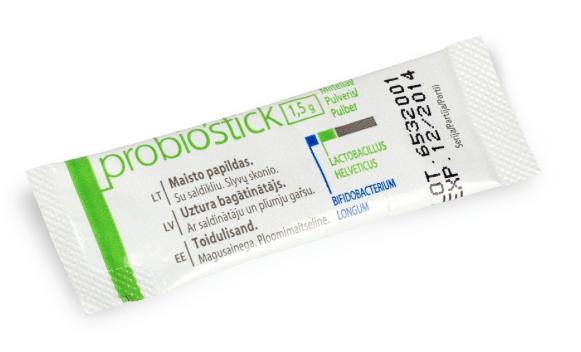Probiotics for Depression & Anxiety-How they work, Brands & Strains
How effective are probiotics for stress and depression relief? Basing on studies how does bacteria influence your moods. What are the best strains and brands to cure stress, depression and anxiety? what do reviews say on probio stick, lactobacillus helveticus r0052 and bifidobacterium longum r0175? Read on to find out.
Probiotics Depression and Anxiety-What is the link?
Probiotic bacteria have the potential to alter brain neurochemistry and treat anxiety and depression‐related disorders according to research published in the prestigious international journal Proceedings of the National Academy of Sciences USA .The research, carried out by Dr. Javier Bravo and Professor John Cryan and their colleagues at the Alimentary Pharmabiotic Centre in UCC, along with collaborators from the Brain‐Body Institute, McMaster University in Canada, demonstrated that mice fed with Lactobacillus rhamnosus JB‐1 showed significantly fewer stress, anxiety and depression‐related behaviours than those fed with just broth. Moreover, ingestion of the bacteria resulted in significantly lower levels of the stress‐induced hormone, corticosterone.
This study identifies potential brain targets and a pathway through which certain gut organisms can alter mouse brain chemistry and behaviour. These findings highlight the important role of bacteria in the bidirectional communication between the gut and the brain “the gut–brain axis” and opens up intriguing opportunity of developing unique microbial‐based strategies for treatment for stress‐related psychiatric disorders such as anxiety and depression”, said John F. Cryan, senior author on the publication and Professor of Anatomy and Principal Investigator at the Science Foundation Ireland funded Alimentary Pharmabiotic Centre, at UCC.
The researchers also showed that regular feeding with the Lactobacillus strain caused changes in the expression of receptors for the neurotransmitter GABA in the mouse brain, which is the first time that it has been demonstrated that potential probiotics have a direct effect on brain chemistry in normal situations. The authors also established that the vagus nerve is the main relay between the microbiome (bacteria in the gut) and the brain. This three way communication system is known as the microbiome‐gut‐brain axis and these findings highlight the important role of bacteria in the communication between the gut and the brain, and offer the intriguing possibility that certain probiotic organisms may prove to be useful adjunct therapies in stress‐related psychiatric disorders.
Microbiota is classified as an ecological community of microorganisms that share a specific host. Within the human body it is estimated that there are trillions of microorganisms, accounting for approximately 1% to 3% of total body mass; equating to an average net weight of around 3 lbs. Though scientists these days are attempting to elucidate the importance of specific microorganisms and combinations within the human body, research in this field is relatively complex.
Additionally, compared to other areas of health research, the human microbiota – particularly within the gut – never received as much attention as it may have warranted; hence the reason it is now commonly referenced as the “forgotten organ.” It wasn’t until the late 1990s that scientists began ambitiously investigating the implications of gut bacteria on immune function. From the 1990s to present day, researchers have managed to unravel links between gut bacteria and numerous conditions including: arthritis, cancer, diabetes, fibromyalgia, multiple sclerosis, and obesity.
Though we know that the gut microbiota mediates propensity to develop deleterious general health conditions, there’s increasing evidence that it may affect a person’s psychological state. Abnormally high concentrations of specific microorganisms in the gut are now linked to major depression, whereas others are associated with better moods. This has led many experts to speculate that supplementation with single and/or multi-strain probiotics may attenuate symptoms of depression and anxiety, while simultaneously improving general health. This has led to coming up of various ways to lessen anxiety and depression.
Lactobacillus Helveticus r0052 and Bifidobacterium Longum r0175
The top two probiotics that have been extensively studied in relation to depression and anxiety are Lactobacillus Helveticus and Bifodobacterium longum
Lactobacillus Helveticus
Lactobacillus helveticus is a bacterium named after “Helvetia,” a Latin reference to the national female goddess of Switzerland.
Preliminary research of Lactobacillus helveticus suggests that it may reduce blood pressure with a similar mechanism to ACE inhibitors. Additionally, this appears to be yet another strain of bacteria that, when supplemented as a probiotic, alleviates symptoms of depression and anxiety.
Bifidobacterium Longum
This is a Gram-positive, catalase-negative, rod-shaped bacterium found in the GI tract of humans. Bifidobacterium longum inhibits growth of pathogenic species and maintains normative function of the gastrointestinal tract.
Studies have shown that it may decrease lactose intolerance, prevent diarrhea, attenuate food allergies, and have an antioxidant effect.
Perhaps administration of this probiotic strain in humans may be beneficial for mood while simultaneously reducing anxiety.
Other Best Probiotics for Depression & Anxiety
They include; Trans-Galactooligosaccharides, Bifidobacterium Longum, Lactobacillus Rhamnosus, Lactobacillus Plantarum, Lactobacillus Helveticus, Bifidobacterium Animalis, Lactobacillus Casei, Bifidobacterium Infantis, Bifidobacterium Breve, Lactobacillus Acidophilus
1. Lactobacillus Rhamnosus
Lactobacillus rhamnosus is a Gram-positive, anaerobic rod that commonly appears in chains. Initially it was thought to be a member of the Lactobacillus casei species, but additional investigation would reveal its status as a standalone species. Preliminary research has documented its therapeutic efficacy for a variety of conditions including: preventing peanut allergies, reducing diarrhea, treating dermatitis, genital tract infections, and obesity.
In animal models, Lactobacillus rhamnosus has been shown to attenuate symptoms of depression and anxiety. A study documented the effect of Lactobacillus rhamnosus upon neurotransmitter systems within the central nervous system. The study discovered that chronic administration of Lactobacillus rhamnosus to mice altered the neurotransmission of GABA (gamma-aminobutyric acid), an important inhibitory neurotransmitter.
They noted that GABA biomarkers were upregulated in certain regions and downregulated in others, indicative of significant neural changes resulting from the probiotic. Like the aforementioned Bifidobacterium longum strain, Lactobacillus rhamnosus exerted its effect upon the brain through the vagal nerve. This specifically led to modified neurotransmission of GABA, which was ultimately associated with decreased anxiety and depression.
2. Lactobacillus Plantarum
Lactobacillus plantarum is a bacterium that was first isolated from human saliva and is ubiquitous in fermented foods. Preliminary evidence suggests that it may decrease soy allergies, attenuate adverse viral effects of HIV, and reduce inflammatory biomarkers throughout the body.
3. Bifidobacterium Animalis
Bifidobacterium animalis is a bacterium localized principally within the large intestines of humans with Gram-positive, anaerobic, and rod-shaped features. This probiotic is commonly found within dairy products, but also appears within an array of foods and dietary supplements. Though the health benefits of Bifidobacterium animalis aren’t clear, initial studies suggest it may reduce bloating and intestinal discomfort associated with IBS (irritable bowel syndrome).
4. Lactobacillus Casei
Lactobacillus casei is a species of bacterium that inhabits the intestine and oral mucosa of humans. The presence of Lactobacillus casei is considered complementary and conducive to the growth of Lactobacillus acidophilus, another healthy bacterium. Industrially, Lactobacillus casei is often utilized to aid in the production of dairy products such as cheeses.
Medically, some evidence indicates that Lactobacillus casei strains such as “Shirota” may inhibit Helicobacter pylori growth to a small extent. Certain strains of Lactobacillus casei may be useful as an intervention for pathogenic bacterial diseases affecting the gastrointestinal tract.
5. Bifidobacterium Infantis
Technically, Bifidobacterium infantis is a subspecies of Bifidobacterium longum, hence the reason most experts simply refer to it as Bifidobacterium longum. However, scientific reports have documented therapeutic effects of this particular subspecies and have actually tested it against parent species Bifidobacterium longum. The Bifidobacterium infantis strain is known for facilitating the production of acetic acid, lactic acid, and formic acid.
5. Bifidobacterium Breve
Bifidobacterium breve is non-motile, anaerobic, and rod-shaped with a cactus-like appearance. It is thought to prevent the growth of candida albicans, an opportunistic fungus that is associated with the onset of oral and genital yeast infections and simultaneously inhibits the proliferation of disconcerting bacteria such as E. coli. Its inclination to compete with other potentially harmful bacteria makes Bifidobacterium breve relatively unique in its mechanism of action.
Research has linked sufficient Bifidobacterium breve in the gut to healthy digestive function.
7. Lactobacillus Acidophilus
Lactobacillus acidophilus a Gram-positive, microaerophilic bacterium that is perhaps the most popular of all bacteria in probiotic formulations. Lactobacillus acidophilus is found within the gastrointestinal tract and oral mucosa of humans and certain strains are understood to elicit probiotic effects. There is significant evidence to support the administration of Lactobacillus acidophilus for the treatment of diarrhea, SIBO (small-intestinal bacterial overgrowth), and vaginal infections.
It is also thought to improve immune function, inhibit growth of cancer cells, and reduce inflammation.
8. Trans-Galactooligosaccharides
Transgalactooligosaccharide is a prebiotic of the galacto-oligosaccharides family generated through enzymatic conversion of lactose. It is a non-digestible food ingredient, that when administered, is thought to stimulate the growth of health-conducive bacteria within the body. Galacto-oligosaccharides are unique in that they contain glycosidic bonds, allowing them to remain unhydrolyzed throughout the salivary and digestive tract.
As transgalactooligosaccharides make their way through the intestinal tract, they promote growth of therapeutic bacteria such as Bifidobacteria and Lactobacilli. Some also speculate that they may interfere with the growth of deleterious bacteria, thereby enhancing immune function, increasing nutrient absorption, and augmenting vitamin synthesis.
Probio Stick-Review
The above discussion is all about strains. In terms of supplements or brands, so far, Probio’Stick is the most sought supplement for depression and anxiety.
Probio’Stick® is a unique probiotic formula by Lallemand Health Solutions It is an association of Lactobacillus helveticus Rosell®-52 and Bifidobacterium longum Rosell®-175 in a stick format. This supplement has been recognized by the Canadian Health Authorities for its benefits on stress, anxiety and mood balance, becoming the first and only probiotic with approved health claims in the gut-brain axis area.
According to the manufacturer, the Natural and Non-prescription Health Products Directorate (NNHPD), the regulatory agency for natural health products in Canada, has approved the following new strong claims for Probio’Stick (Claim NPN 80021343):
- Helps to moderate general feelings of anxiety;
- Helps to reduce stress-related gastrointestinal complications such as abdominal pain;
- Helps to reduce gastrointestinal complications like abdominal pain and nausea in healthy people experiencing mild to moderate stress;
- Promotes a healthy mood balance;
- Helps to reduce gastrointestinal discomfort (e.g abdominal pain, nausea, vomiting) in those experiencing mild to moderate stress resulting from life events (e.g academic exams)
Other Brands known for mood include; Garden of Life Dr. Formulated Probiotics Mood


how can I get the probiotic stick
can i take probiotic stick after having colon cancer operation 10 months ago compleat success no chemo or radiation needed i have bad anxiety i wanted to use you probiotic stic with longun in and l rhamous in
i had a colon cancer operation in febuary totally succesfull can i take a probio stick with longun in and helivectus for anxiety safely